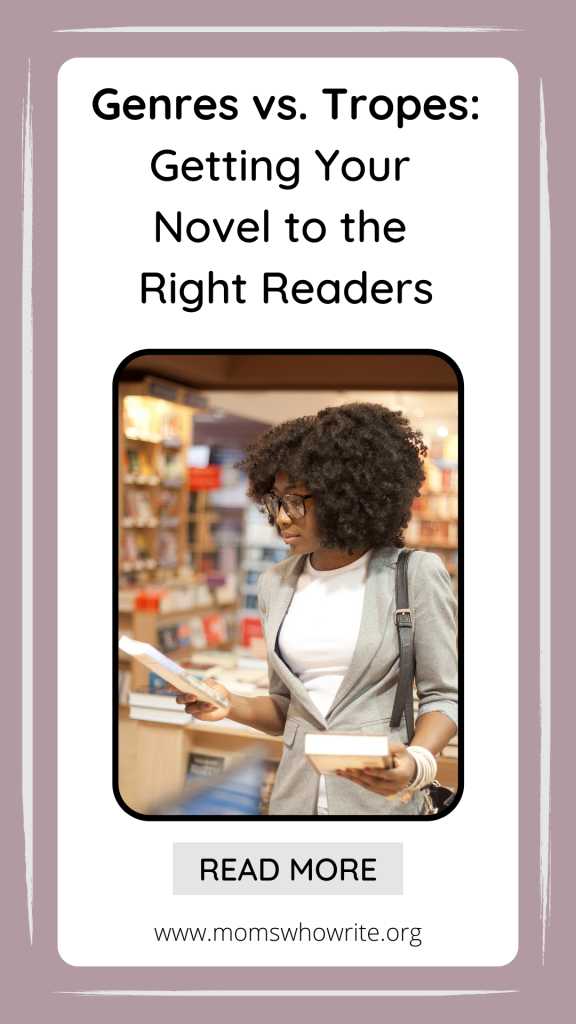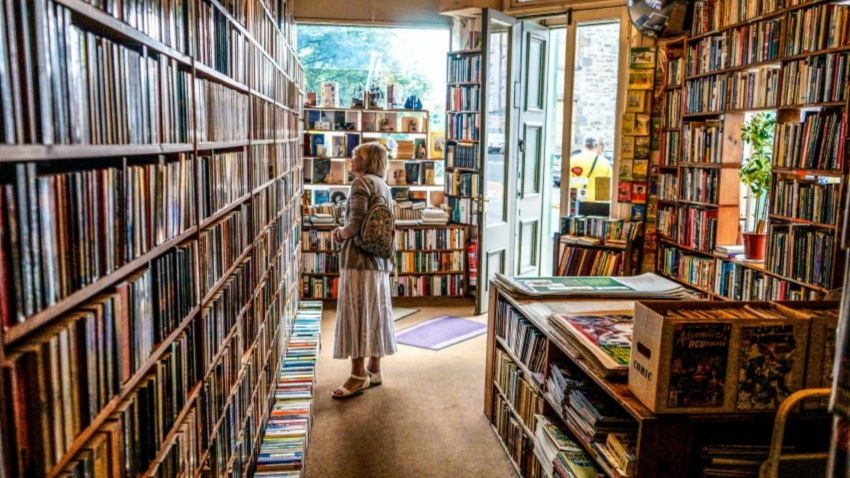I worked on my novel baby for about 15 years before I ever started researching how to get published. Pretty much instantly, I began encountering jargon and abbreviations that I’d never seen before. It was overwhelming! Luckily for you, we here at Moms Who Write are in this together. So today, we’re going to talk about two of the most important terms that relate to writing, publishing, and marketing your book: genres vs. tropes.
And yes, they are very important.
Why do I need to know the difference?
Has anyone asked you that dreaded question yet? No, not Are you done with your book? The other one: What is your book about?
It seems relatively simple, but it’s far from it when caught off-guard. Either you founder hopelessly to sum it all up, or you wind up telling the entire story. So what are you going to do when it matters? How will you answer this question to a potential literary agent, a hired blurb writer, or a customer?
There are specific categories (genres and tropes) every book falls at least partly into. Knowing those categories and understanding the scope of how they apply provides a recognizable framework of description. On that, you can add a few of your own special details to create a short but engaging explanation of any story.
The basics of genres vs. tropes
Science people, think of genres and tropes as your animal kingdom vs. species—er, story kingdom vs. species. A genre is a type of story with a familiar model, such as a mystery or romance. A trope is a plot mechanism commonly used within that genre, like a damsel in distress situation or a “chosen one.”
These are not to be confused with reading age groups, such as “middle grade” or “young adult,” which you may find tacked on to the beginning of a bookshelf genre. For instance, Harry Potter is a middle-grade (age) fantasy story (genre) centered around a “chosen one” (trope). Let’s dive in a little deeper.
Genres
Common genres include mystery, romance, science fiction/ fantasy, humor, and so forth. Your book may or may not fit snugly into one of these categories. For instance, you may have written a fantasy romance or a humorous mystery. That’s ok! When it comes to deciding where to shelve that book in stores, you’ll have to think about the audience you’re seeking, where they’d look for new reads, and choose your primary genre accordingly. In the meantime, feel free to tell people about your book using both genres, to give them the best idea of what you’ve created.
However, your book description can—and should—get even more specific. For every genre, there is a subgenre. Is your mystery a thriller or a suspense mystery? Is your romance contemporary or historical? There are too many examples for me to dive into this very deeply here, but do your research and know your work with proper writing-industry terms. I promise that knowing this stuff and how it applies to your writing WILL help you sell more books!
For the record, I’m not advocating that you research genres and try to shoehorn your story into one. I am not telling you to conform to the existing model. I’m suggesting you write your story, YOUR STORY, however it goes—then analyze it, so that you can talk about it professionally and understand how to funnel it to the readers who will appreciate it best.
Understand your genre, and all of your next steps will be easier. You will hone your blurb and synopsis, choose the proper location at bookstores, and target your marketing with infinitely greater effectiveness.
Tropes
While most of us have heard the word genre before, tropes are something we don’t tend to think about or know about until we venture into the writing community.
Every story uses tropes. As the Bible says, there’s nothing new under the sun! That doesn’t mean, however, that every story is the same. The same trope can be used very differently, or even flipped upside down, between two stories.
I’m going to use romantic tropes as an example here, as they are found everywhere and easy to recognize once you look for them. As you think about your romantic characters, do they have an enemies-to-lovers thing going on? Perhaps a best-friends-to-lovers? What about one character with two equally tempting choices—the love triangle? Maybe we’re talking about a second chance romance, or a fake relationship turned real, or destined soul mates.
Hopefully, all these examples illustrate that one trope contains a world of larger possibilities. Yet, when you boil down any romantic relationship, you will eventually discover that it falls into one of these (or other) familiar dynamics.

The key difference between genres and tropes
Remember, a genre describes a type of story, but a trope describes an element pushing the plot along. Genre divides can be very rigid, even if your book falls into more than one genre; for instance, a fantasy mystery would not be confused with a historical romance. Tropes are a little more fluid, in that they define something central that many storylines across many genres could have in common. One trope could be executed a thousand ways between unique characters and circumstances.
The reason you’ll want to understand this difference, and every genre or trope that applies to your novel, is simple when you look at an example. You tell me which is more likely to sell a book:
My book is so good! It’s got elves and dwarves and fights and battles… and of course, Lara is in love with Geret, but you know he’s part of this tribe that hers is enemies with, and they’re all at war with the giants…
OR:
This book is right up your alley. It’s an epic fantasy with a big dose of slow burn, enemies-to-lovers romance with high stakes during a time of war.
Would you look at that—now you’ve basically got an elevator pitch.
So next time you’re faced with that dreaded and wonderful question, what is your book about, don’t freeze! Don’t ramble! Be ready.
About the Writer: Kathryn Tamburri (@KathrynTamburriAuthor) writes clean YA epic fantasy novels which seethe with slow-burn romance. You can find more of her writing tips on The Devo Blog at KathrynTamburri.com, and learn from her publishing journey by subscribing to her fun author newsletter!

1 thought on “Genres vs. Tropes: Getting your novel to the right readers”